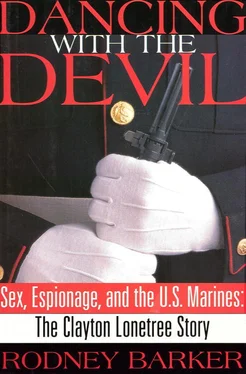A swell of laughter from inside the pub turned their heads in the direction of the revelry.
“I see you guys are elated with the verdict.”
Tight-lipped and solemn, Major Beck replied, “What’s there to be elated about when a Marine is convicted of betraying his country?” and walked away.
• • •
In the days after the trial officially ended, the sentence was the subject of extensive reporting and editorializing. The majority of the conservative papers thought Lonetree had gotten off easy compared with other recent espionage defendants like John Walker, Jerry Whitworth, Jonathan Pollard, and Ronald Pelton. The Washington Times ran an article with the heading “Lonetree’s 30 Years Scored as Too Light,” in which a spokesman for the Washington Legal Foundation, a public-interest law firm that had lobbied for the death penalty in major espionage cases, denounced the sentence as an inadequate deterrent to others. “There is no better case that demonstrates why we need the death penalty in espionage cases that jeopardize the lives of American personnel or national security…. The Soviets would certainly know what to do with a traitor like Lonetree.”
While no reputable papers went so far as to call the sentence a miscarriage of justice and Sergeant Lonetree a martyr, some of them, like The Baltimore Sun, did keep alive certain questions raised in the course of the court-martial: “What about the embassy security officer, who should have known these Marines were playing around with Soviet women? What about the administrative officer, the ambassador, the State Department’s security office, the commander of the Marine detachment that trains embassy guards, the secretary of state? What, indeed, about the president himself, who was warned about this problem more than two years ago?”
Lonetree’s civilian counsel condemned the sentence, of course, and said they had pledged to their client that appeals of what they called a “prejudiced” outcome, in which race had gotten in the way of justice, would be taken all the way to the Supreme Court, if necessary.
“They controlled the referee in round one,” Mike Stuhff told The New York Times, “they” meaning the government. “And on appeal we’re going to have a different set of referees for round two.”
William Kunstler announced that he would seek to have the sentence set aside on the ground that prosecutors had “falsely and emotionally” portrayed Lonetree as the first Marine ever convicted of spying, when he was aware of at least four other cases of Marines having been convicted of espionage-related offenses. He maintained that this false impression had led the jury to an emotional decision of thirty years.
Meanwhile, in his office in the basement of Lejeune Hall, Major Henderson was dealing with more immediate concerns. Henderson took no satisfaction in having heard from the jury that they had been prepared to give Lonetree life before hearing his closing statement. He was doing what he could to get his client’s sentence reduced even further. A host of counterintelligence agencies were anxious to debrief Sergeant Lonetree and obtain a full account of his recruitment by Soviet KGB agents and all his spying activities. Henderson, through discussion and negotiations, was trying to get as much time off as he could in trade for his client’s cooperation.
He knew they did not have much leverage to bargain with, certainly nothing like they’d had before the trial, so it was not a matter of what it was worth to him but what it was worth to the government, which held all the cards. When it offered five years, which would take the sentence down to twenty-five years, Henderson was disappointed. He’d hoped for more. But he thought they should take it. When he spoke to Stuhff and Kunstler, however, they disagreed.
William Kunstler spoke for both civilian counsels when he wrote Major Henderson a letter to make his position perfectly clear. “I am totally against accepting such an offer for a number of reasons. First of all, it is so insignificant, insofar as time is concerned, as not to amount to anything. Secondly, I believe that it weakens our appellate position in that the acceptance of such a picayune offer is, in my opinion, tantamount to proclaiming that Clayton is so desperate that he will agree to anything because he does not trust the appellate process. Lastly, and perhaps most importantly, I think that further interrogation of Clayton will be used to try to get him falsely to incriminate others… so that NIS and the Pentagon brass, along with the State Department, can fabricate the Marine ‘spy ring’ at the Moscow Embassy and thus flesh out the original theories propounded last Spring…. I believe that the thirty years were imposed to force false admissions from our client, just as Judge Sirica imposed similar sentences in the Watergate affair. This case simply cannot be treated as any other court-martial. Its politics are far-reaching and pervasive….”
Kunstler believed he had a better idea. In fact, at the very time he wrote that letter he was involved in negotiations with the producers of 60 Minutes, the highly rated CBS newsmagazine, who were interested in opening their 1987 season with a sympathetic segment on Sgt. Clayton Lonetree. Diane Sawyer was slotted to conduct the interview, and Kunstler thought this would be an ideal forum for winning public support and exposing the weaknesses in the government’s case.
Henderson thought that would be a big mistake—for the same reason he didn’t put his client on the stand. It would be placing Lonetree in a public situation for which he was profoundly unfitted. No one knew what Clayton would say next, which could be disastrous. What if, on national television, he said something incriminating? Something that damaged his appellate hopes or could be used against him in a retrial?
The difference of opinion on the defense team was at an impasse when two men walked into Major Henderson’s office and helped resolve matters.
Lt. Col. Jim Schwenk came storming in one day, slammed an order to testify on his desk, and said, “Dave, here it is. You can take this deal and get five years off. Or we’re going to order him to debrief, and if he refuses, five more will be added on for disobedience. It’s time to choose.”
Henderson was sitting there pondering his next move when another man arrived: a Minneapolis attorney by the name of Lawrence Cohen, who said he had been retained by Spencer Lonetree, Clayton’s father, to represent his son. Henderson looked at him askance. By this time he’d had his fill of civilian counsels. But before he could invite Cohen to kindly leave well enough alone, Henderson heard the man saying things like “Bill Kunstler is the last person who should have been representing a Marine in a court-martial. He should be fired.”
As Henderson would later describe his reaction, “Bells went off…. At last someone was talking sense.”
The dismissal of the two civilian attorneys who had been identified with Sgt. Clayton Lonetree from the start was public and messy. In a letter drafted for him by Cohen, Lonetree stated he had lost confidence in both Stuhff and Kunstler as far back as August and did not want “to continue to be represented by persons in whom I do not have faith.” He instructed them not to talk with the media about his case any longer and informed him that his lead attorney from this moment on was Major Henderson.
Stuhff was outraged that a deal had been put together behind his back. There were solid appeals issues he wanted to pursue. He was also more than a little displeased at being booted off the case so unceremoniously after all the time, effort, and expense he had put into it. Kunstler, for his part, said he believed this was something initiated by the military, which was trying to drive a wedge between them and their client in an effort to get Lonetree to cooperate with authorities.
Читать дальше












